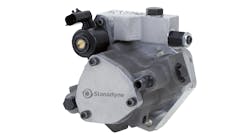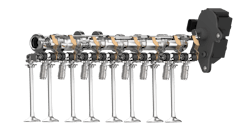I subscribe to more blogs and newsletters than I will ever have time to read. But a couple of headlines recently caught my eye that foretold of dramatic reductions in vehicle sales and the impact this will have on vehicle service and repair. If there is a prediction of the demise of the industry that I’ve spent my life in, I’m going to read more.
Peter Diamandis is the founder and chairman of the XPRIZE Foundation. He also is the co-founder of Planetary Resources, which launches mining robots to asteroids, and of Human Longevity Inc., which performs genome mapping and cell therapy. The guy is a brilliant futurist; but, his gift is for making the future real today.
Peter’s recent blog predicted massive declines in automotive sales brought about by the emergence of Cars as a Service (CaaS), the disruptive impact of tech companies displacing traditional automotive companies and virtual reality, which eliminates the need to “move your meat body” from one city to another for business travel. His conclusion – “There’s a tsunami of change coming and auto companies can ride atop it and embrace change or get crushed” – is hard to argue with.
Ever faster rates of change are always disruptive to traditional businesses. But, the automotive industry could be more resistant to disruption than first appears.
Jim Lang’s Aftermarket iReport is always a concise and insightful addition to my inbox. Jim recently speculated on the impact of software, as applied to driverless and driver-assisted vehicles; alternative power for propulsion and the huge market power of the new Big 4 – Apple, Google, Tesla and Uber. With a combined market value of more than $2 trillion, the new Big 4 are worth more than all automakers around the world, together. Jim concludes that “driverless vehicles will change the relationship between consumers and their vehicles.” Could America’s love affair with the automobile be over? Will the next generation be content to leave the driving to Siri?
Leave it to a shop owner to bring the voice of reason to this debate about the impact of technology and autonomous vehicles. Jason Bigelow, founder of Advanced Tire and Auto in Aberdeen, N.J., wrote in Aftermarket Business World that the initial application of driverless cars will be for transportation-on-demand, delivery services and carpooling. Jason is excited about the impact of these 24/7 additions to the vehicle fleet on his service bays because they will accrue miles faster and require more regular maintenance.
Common to all of these applications is that that the consumer is either sitting in the back seat or doesn’t interact with the driver in any way. For years we’ve been conditioned to sit back and relax as millions of people ride an autonomous tram at the airport every day. If driverless cars, trucks and buses can help even out highway utilization by operating around the clock and reducing fatalities and property damage in the bargain, that sounds like an all-around win that the public will widely embrace.
But, there’s a big gap between the disruptive impact of autonomous vehicles and calling for the demonetization of the automobile and the demise of the traditional automakers. We do live in an age of exponential change and disruption in pursuit of efficiency and savings. I would not want to be a taxi-driver or hotel owner in an age of Uber and Airbnb.
Autonomous vehicles do pose an opportunity to fractionalize the cost of vehicle ownership for getting you or your packages from point A to point B. And while Uber-math may reduce the cost of a mile to a small fraction of what it is today, that does not mean vehicles will stop being sold or that maintenance will no longer be required.
For decades to come these vehicles will operate as an addition to the vehicle fleet and not a replacement. They will accumulate more miles in less time due to their full utilization. They will be largely owned by commercial businesses with a keen interest in up-time. Therefore, the early autonomous vehicle fleet will be better maintained and serviced than the existing vehicle fleet. And, until they start building cars that don’t break and parts that don’t wear the auto care business will do just fine.
Americans have a 100-year-old love affair with the freedom of total mobility. Performance and horsepower are said to be less important to the youngest drivers. But, you couldn’t prove that from a walk through the SEMA show. We’re told younger drivers prefer connectivity and on-board apps.
Most Americans are going to want to cling to the ability to sit behind the wheel and go where they want on their own terms. And with the reduced traffic congestion brought about by ride-sharing and overnight autonomous deliveries, we’ll all get where we’re going in less time, with less stress and less wasted fuel.
The automotive industry is certainly going to change dramatically in the next couple of decades. But, a steering wheel and accelerator are going to remain standard equipment, not optional, in private vehicles for a long time to come.
Subscribe to Aftermarket Business World and receive articles like this every month….absolutely free. Click here.

